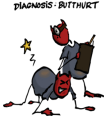“As I says, ’tis queer haow picters sets ye thinkin’. D’ye know, young Sir, I’m right sot on this un here. Arter I got the book off Eb I uster look at it a lot, especial when I’d heerd Passon Clark rant o’ Sundays in his big wig. Onct I tried suthin’ funny—here, young Sir, don’t git skeert—all I done was ter look at the picter afore I kilt the sheep for market—killin’ sheep was kinder more fun arter lookin’ at it—” The tone of the old man now sank very low, sometimes becoming so faint that his words were hardly audible. I listened to the rain, and to the rattling of the bleared, small-paned windows, and marked a rumbling of approaching thunder quite unusual for the season. Once a terrific flash and peal shook the frail house to its foundations, but the whisperer seemed not to notice it.
“Killin’ sheep was kinder more fun—but d’ye know, ’twan’t quite satisfyin’. Queer haow a cravin’ gits a holt on ye— As ye love the Almighty, young man, don’t tell nobody, but I swar ter Gawd thet picter begun ta make me hungry fer victuals I couldn’t raise nor buy—here, set still, what’s ailin’ ye?—I didn’t do nothin’, only I wondered haow ’twud be ef I did— They say meat makes blood an’ flesh, an’ gives ye new life, so I wondered ef ’twudn’t make a man live longer an’ longer ef ’twas more the same—”







![Glory to Codexia! [2012] Codex 2012](/forums/smiles/campaign_tags/campaign_slushfund2012.png)







 .
.




